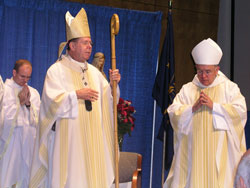Archbishop Chaput: Love others and help God change the world

Archbishop Daniel M. Buechlein offers the closing prayer at Mass during the Indiana Catholic Men’s Conference on Sept. 22. To his right is Denver Archbishop Charles J. Chaput, who was the homilist for the Mass.
By Mike Krokos
We are all a part of God’s unfolding plan.
As Catholics, we believe definite things about our role in salvation history.
Our mission on Earth must center on the reason why God made each of us: to be holy and “help him in his plan to share his love with the whole world.”
That message was shared by Denver Archbishop Charles J. Chaput, one of the keynote speakers at the second annual Indiana Catholic Men’s Conference, on Sept. 22 at the Indiana Convention Center in Indianapolis.
“To be Catholic is to be very unique among the world’s believers. To be a Catholic means believing that you are a part of a vast historical project. And it’s not our project. It’s God’s,” Archbishop Chaput told the more than 1,000 men in attendance.
“Being Catholic means believing that since the beginning of time God has been working out his own hidden purposes in the history of nations and in the biography of every person. He’s still unfolding his purposes today, and each of us here has a part to play in his divine plan.”
Sponsored by the Marian Center in Indianapolis, the title of the conference was “Lions Breathing Fire: Living the Catholic Faith.” Taken from a homily by St. John Chrysostom, a fourth-century saint, it describes what people should be like after receiving Communion.
In his presentation, “Renewing the Church, Converting the World—Reclaiming our Catholic Mission,” the archbishop compared the Bible to the sacred books of other world religions.
“What all the sacred texts of other religions have in common is that they’re essentially wisdom literature. They’re collections of noble teachings aimed at helping believers live ethically and find the right path to peace or happiness or enlightenment,” he said.
The Bible also aims to make people wise, Archbishop Chaput said. “But it does much more. It seeks to lead them to salvation, which is much more than enlightenment.”
While the Old Testament begins with a step-by-step report of the first day in the history of the world, the New Testament continues that history, Archbishop Chaput said.
The precise historical markers throughout the Bible help us in not only understanding the life of Adam and Eve and their descendants, they assist us in learning about Jesus of Nazareth, and the community he founded, the Church, he added.
As Catholics, we believe in the Incarnation and are “the only religion to remember our founder’s executioner by name every time we profess our faith [in the Apostles’ Creed],” Archbishop Chaput noted.
“Pontius Pilate and Mary are mentioned by name in the creed. Why? The reference to Mary, his mother, guarantees Christ’s humanity,” he said. “The reference to Pilate, who condemned him to death, guarantees his historicity.”
The creed not only tells us about the past. It also speaks to the future, where “we believe Jesus Christ will come again in glory to usher in a kingdom that will have no end,” Archbishop Chaput said.
“If the Incarnation represents the past, and the Second Coming represents the future, then the Church is always the ‘present tense’ of God’s plan for history and for each of our lives,” he said.
The Church exists to “proclaim God’s love and the Good News of Jesus Christ to the ends of the Earth,” Archbishop Chaput continued. “We’re here to make disciples of all nations.”
That task falls on all of us, the archbishop said, not just members of the clergy.
“The demands of holiness apply to every one of us—and in a special way to husbands and fathers who have the task of leading us,” he said. “No excuses. No exceptions.”
The Church also exists to change sinners into saints.
“This is no ordinary human institution,” Archbishop Chaput said. “In fact, there’s never been anything like the Catholic Church in the history of the world. And there won’t ever be again.”
For the Church to be renewed and revitalized, the renewal must begin inside each of us, the archbishop said.
“As Catholic men, you have an ‘ecclesial’ being and identity. You’re leaders by virtue of your vocation as husbands and fathers, and the Church is where you belong,” he said. “It’s where God called you to be. In the Church, you will find God’s will for your life.”
In our mission to be holy, we must work against the “practical atheism” that has become a world religion, Archbishop Chaput said. The late Pope John Paul II wrote about that challenge in Memory and Identity, his last book finished just before his death in 2005.
How can we convert the world? Through divine love, which “remains the most revolutionary idea in the world,” Archbishop Chaput said.
“Christian love is not weak or anesthetic. It’s an act of the will. It takes guts. It’s a deliberate submission of our selfishness to the needs of others,” he said. “There’s nothing ‘unmanly’ about it, and there’s nothing—and I mean nothing—more demanding and rewarding in the world.”
We can turn the world upside down, Archbishop Chaput added, if only we’re willing to love.
“Do everything for the glory of God, even the little things you have to do each day. Love those who don’t love you. Love—expect nothing in return. Love—and those you love will find Jesus, too,” he said. “Love—and through your actions, God will change this world.”
(More coverage of the Indiana Catholic Men’s Conference will appear in next week’s issue.) †
